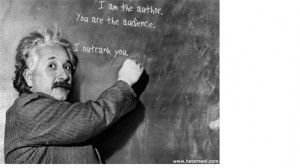I see a lot of talk on the blogs about writing characters – especially establishing goals for your characters, putting obstacles in their path, directing your characters like rats in a maze by blocking the path and making them work harder to fight their way out.
Sometimes I wonder if the reader sees through all that plotting. The last thing you want is your story looking transparently like an equation: character + goal < obstacle = need for ally + escalate action > new obstacles = goal achieved + boy gets girl.
Writers want to build a world that is convincing and real, a world in which the reader can become immersed – and create characters the reader worries about every time s/he has to close the book to eat dinner, shower, or go to work. But I don’t think we should forget that the author is in charge on the other end – manipulating the reader. Yes, think of the reader as your puppet. You’re in charge of what they know and what they think.
A few years back, I was working on a short story for an anthology with editor Michael Katz. The ending of my story was a real dud, and we were brainstorming alternative endings (let’s call them A and B). I liked Ending A, re-wrote the story to incorporate it, and sent it to Michael. His response: “Wonderful! Much better! Now, re-write it again so the reader thinks you’re going for Ending B, while you’re really heading for Ending A all along.” And he was correct.
So, I’ve spent the last few weeks mulling over the beginning of my current WIP. I just wasn’t getting it right, and for a long while, I didn’t know why. I knew what my MC’s goal was, and I felt as if the reader would understand it – but somehow, the whole thing came out flat.
Then I realized. Who says the reader has to know exactly what his goal is? Yes, of course I need to establish his goals, determine his obstacles, and make sure all his actions are designed to overcome them. That’s my job.
But that doesn’t mean I can’t mislead the reader into thinking his goals are something else entirely. Something that already fits the story and makes just as much sense. Something that adds more tension to the opening.
Sure, I’ll reveal the truth along the way. But I’m the author. I get to say when.
The interactive Einstein blackboard above is from Hetemeel.com. The quote on the board is from The Producers by Mel Brooks, of course!

This is such a tricky balance, and on either side is being hamhanded or being underhanded. I totally agree, you can’t have the MC come right out and say what his goals are, in fact, I think it’s better when they’re not obvious (especially at first), even to him/her. But you can’t be cheaply and artificially deceptive, either, or it’s going to tick the reader off!
First off, I LOVE that Einstein pic!
I’ve read a bazillion books in my lifetime (no kidding!) and the books I enjoy the most and remember the longest are the ones that catch me by surprise. So, yes! Don’t tell your readers everything upfront. Keep ’em guessing. Just because you know the goal doesn’t mean you have to share that info. Lyrical writing and memorable characters and plots are important, of course, but engaging your readers’ minds will leave the most lasting impression.
Love the Einstein pic w/the Producer’s quote!
You’re right — the author is in control, and manipulates the reader. The trick, of course, is not to let the reader become aware of it. At least, not before the end. 😉
Oooh, great post and now I’m totally curious as to what was changed!
hi miss dianne! cool post! more good stuff im learning for being a good writer. i like being a puppet person. for sure i like surprises and gotcha and yikes i didnt see that coming stuff when im reding a book. but im thinking like miss sarah said you gotta do a balance so you dont make the reader close the book and not come back to it.
…hugs from lenny
I think the element of surprise is often underused. That was something I really liked about the book Uglies; the characters did things that surprised me, things I hadn’t thought of, which made reading so much more enjoyable.
That’s brilliant. In one of Sol Steins’s books on writing he talked about an experience he had at the writing workshop where they, the writers, had to role play. He was given one story line (principal expelling a difficult student) and another writer was the mother of the (in her mind) perfectly good student who was being persecuted by an unfair principal. Neither knew the other’s different viewpoint, and it made for wonderful conflict. I love the idea of keeping the reader guessing.